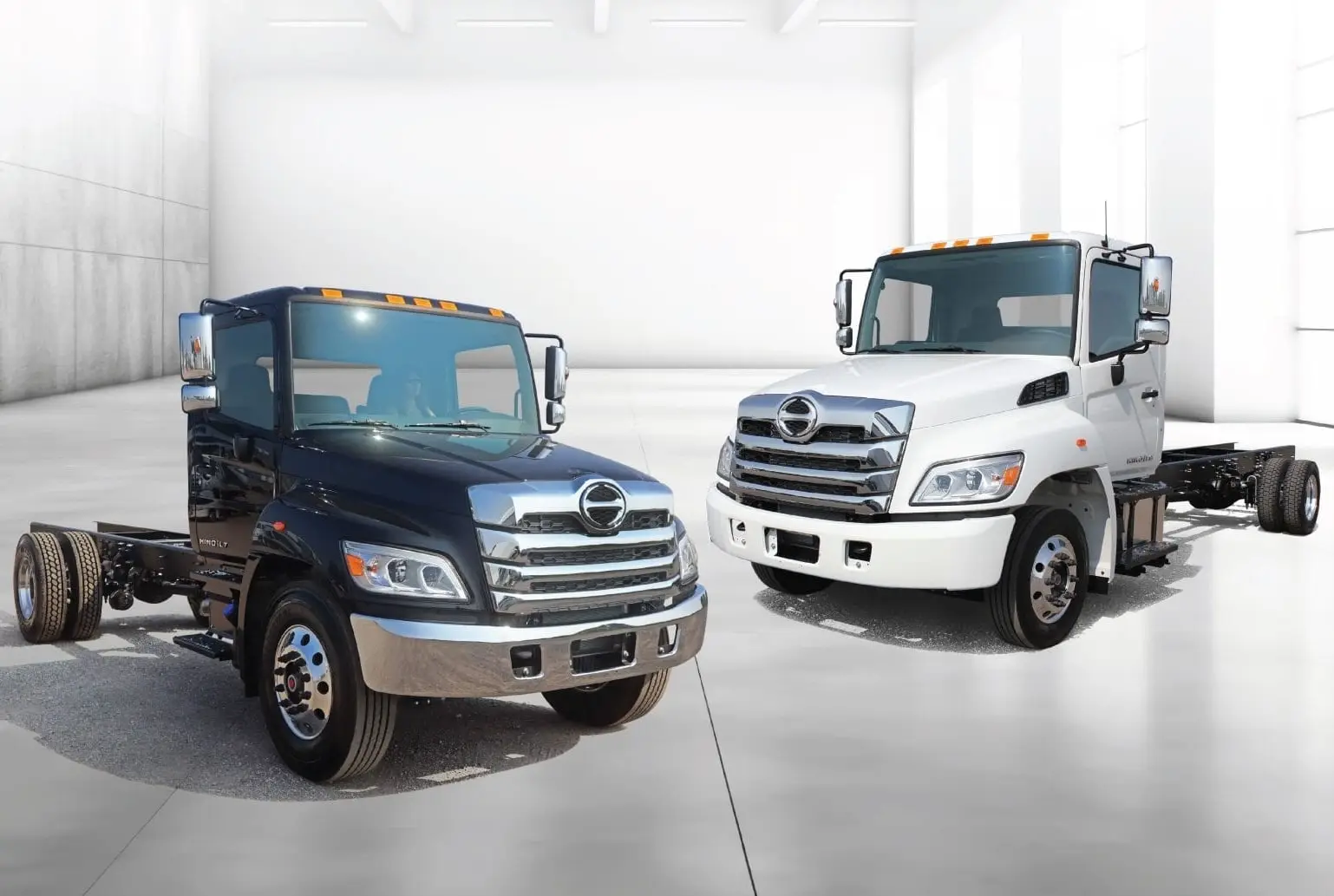Need help or informations ? Call us : (450) 641-1115
0.00 $
No products in the cart.
Buy vs rent Hino truck: Which is the most cost-effective choice?

🔧 Quick summary: Buy vs Rent Hino truck for SMBs in Quebec
Purchase = higher initial investment ($50,000 to $60,000) but long-term profitability and advantageous resale
Rental = lower monthly payments (up to -30%), ideal for seasonal needs or financial flexibility
5 criteria to analyze: monthly budget, length of use, debt ratio, available subsidies, hidden costs
Assistance available: Écocamionnage, Roulez vert grants, tax credits (up to $9,000 in savings)
SME tip: mix purchase + rental = optimized fleet, reduced risks, better tax deductions
Wondering whether to buy or lease a Hino truck for your South Shore SME? Between unexpected maintenance costs and tight budgets, choosing the right option becomes a headache. This guide compares buying and leasing Hino trucks in Canada, with concrete cash flow figures and local feedback. Find out why owning your own truck could boost your profitability, even in the face of Quebec’s logistical challenges.
Financial analysis for South Shore SMEs
On Montreal’s South Shore, carriers are juggling US tariffs and adapting to the new transportation network. With REM shaking things up and margins melting like snow in the sun, every decision counts.
To make an informed decision, evaluate these five important aspects:
- Actual monthly budget: Calculate your leeway by comparing your cash inflows and outflows (a Hino 195 requires 15-20% of sales in transport).
- Horizon of use: Determine whether your need is occasional (3-5 years) or permanent – models like the Hino L7 are more valuable on resale.
- Debt ratio: Check your ability to absorb a 60-month loan without affecting your working capital (recommended threshold: <30% of sales).
- Accessible subsidies: Explore Quebec programs like Écocamionnage and Roulez vert that can cover up to 25% of the cost of an electric XL8.
- Hidden costs: Allow 6-10% of the annual purchase price for maintenance – tires on a Hino L6 cost 20% less with an inclusive rental.
Buying a Hino 195 requires an initial outlay of $50,000 to $60,000 including taxes, compared with an average of $3,000 for a lease. But beware: Hino financing programs often make all the difference, especially with advantageous rates for local SMEs.
Take Transports Lemieux in Longueuil: by buying its Hino 195 rather than leasing it, the company saved 18% over 3 years, despite the off-peak seasons. The secret? Negotiated maintenance with Hino Rive-Sud, smoothing out expenses over the year.
Advantages and disadvantages by option
Buying: a tailor-made investment
| Model | Financial characteristics | Impact on total cost |
|---|---|---|
| Hino 195 | Initial investment of $50,000 to $60,000 (used) Maintenance: 6-10% of annual cost 5-year engine warranty | Transferable warranty preserves resale value Predictable maintenance costs |
| Hino L6 | Flexible financing via Toyota Commercial Finance Available Hino protection programs Eligible Quebec subsidies | Controlled depreciation Tax credits up to $4,000 Fixed monthly costs |
| Hino L7 | Improved load capacity Maintenance included 1 year/50,000 km HinoWatch 24/7 support | Increased ROI through productivity Reduced downtime Tax optimization |
| Hino XL8 | Certified energy efficiency Eligible for Écocamionnage Go Green bonus up to $5,000 | Fuel savings up to 15% Advantageous tax deductions Reduced depreciation |
Personalizing your Hino is like choosing a tailor-made suit: corporate paintwork, ergonomic cab layout or engine reprogramming. But beware of warranties – it’s better to go through authorized professionals like Hino Rive-Sud to keep your rights intact.
Quebec SMEs can accumulate up to $9,000 in assistance with Ecocamionnage grants and Hino Canada rates. A significant boost when you consider that unexpected maintenance on an L6 can eat up 15% of your annual budget.
The key? Allow 8-12% of the purchase price in hidden costs. But with the good maintenance reflexes keep your cash flow under control.
Leasing: strategic flexibility
Hino leasing contracts are generally for 36 to 60 months, with monthly payments 30% lower than a conventional loan. The trick: negotiate the mileage included and the return clauses to avoid unpleasant surprises.
The all-inclusive packages are worth the detour: tires, oil changes, 24-hour assistance and even vehicle replacement in the event of a major breakdown. Perfect for Saint-Hubert transporters juggling seasonal peaks.
Take the example of an eco-responsible delivery company: by renting electric XL8s via the Roulez vert programs, it boosted its image without breaking the bank. The result: 40% more requests for public contracts in 18 months.
Impact on cash flow and corporate strategy
For a small business on the South Shore, devoting more than 20% of sales to transport can become stifling. Renting allows you to smooth out expenses, while buying a Hino L6 offers an immediate tax deduction – provided you’re strong enough.
Mixing purchasing and leasing is like putting together an economic menu: owning 2 Hino 195s for regular journeys, and leasing an electric XL8 for seasonal peaks. This hybrid approach reduces debt while maintaining a modern fleet. Our analysis of Hino fleet strategies shows an average gain of 12% on annual cash flow.
“After 5 years managing 15 trucks in Brossard, the real trap is to underestimate maintenance,” confides Marc D. One of his Hino L7s lost 40% of its value in 3 years due to a lack of preventive maintenance. His advice?“Always negotiate warranties with your Groupe National Hino Rive-Sud dealer – it saves thousands in the event of a glitch.”
Opting to buy a Hino truck maximizes your long-term cash flow, while leasing offers immediate flexibility. By combining the two, Canadian SMEs can adapt their fleets without complicating their lives. Check out Hino Canada’s financing programs today: your next vehicle could well seal the future of your operations.
Frequently asked questions Buy vs. Rent Hino Truck (FAQ)
Is Hino a reliable brand?
Hino is widely recognized for its reliability and durability in the truck sector, making it a popular choice for businesses. This reputation is supported by the use of Cummins engines on certain models, contributing to robust performance.
However, it is important to note that Hino has faced scandals linked to irregularities in engine testing, which have affected its credibility. Despite these incidents, its membership of the Toyota group remains a guarantee of quality for many customers.
Who makes Hino trucks?
Hino trucks are manufactured by Hino Motors, Ltd, a Toyota Group company specializing in the production of trucks, buses and wheelbarrows. Hino Motors is headquartered in Hino, near Tokyo, Japan.
Hino Motors Canada, Ltd. is the exclusive distributor of Hino products in Canada. HINO MOTORS MANUFACTURING U.S.A., Inc (HMMUSA) produces medium-duty commercial trucks (classes 6 and 7) in the United States.
What models of Hino trucks are available in Quebec?
Here is the list of Hino trucks available in Quebec:
Hino 155 / 195 series
Type: Light trucks (Class 5)
GVWR: Up to 19,500 lb
Applications: Urban delivery, food services, light transport
Features: 5.1 L J05E-TP diesel engine developing 210 hp, short turning radius, air suspension available on model 195
Hino 258 / 268 series
Type: Medium-duty trucks (Class 6)
GVWR: Up to 25,950 lb
Applications: Regional transport, towing, medium-duty delivery
Features: Versatile and robust, adapted to the varied needs of Canadian companies
Hino 338 / 358 series
Type: Medium- to heavy-duty trucks (Class 7)
GVWR: Up to 33,000 lb
Applications: Heavy-duty transport, municipal services, construction
Features: Equipped with J08E-VB and J08E-VC engines for power and reliability on Canadian roads
Hino L series (L6, L7, L8)
Type: Medium- to heavy-duty trucks (Classes 6 and 7)
GVWR: 25,500 to 35,000 lb.
Applications: Regional transport, heavy-duty delivery, specialized services
Features: Cummins B6.7 engine, Allison transmission, enhanced ride comfort, customizable chassis
Hino XL series ( XL8)
Type: Heavy-duty trucks (Class 8)
GVWR: Up to 60,600 lb
Applications: Long-distance transport, heavy construction, industrial logistics
Features: Cummins L9 engine, spacious cabin with advanced technologies, various configuration options
Recent articles
- All Post
- Employment
- Non classifié(e)
- Security
- Services
- Technology
- Transport
- Truck


More articles



Hino South Shore Dealer in Boucherville | Truck Service and Maintenance
Ensure that your trucks remain efficient, safe and ready to face the challenges of the road.
Need informations ?
All rights reserved © Groupe National Hino.INC. Powered by WebPlify




